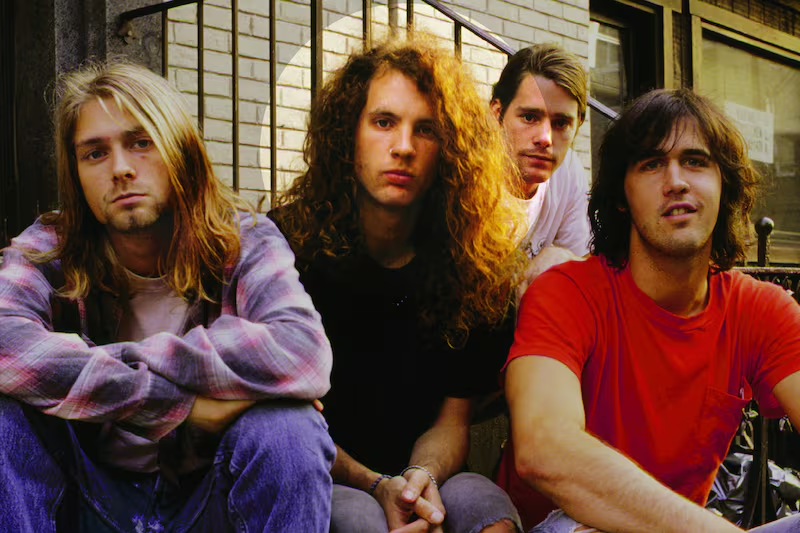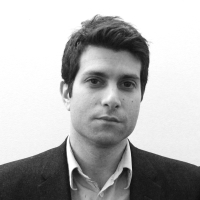It’s a little past 1 am on Friday morning and the weekend warriors are trying to hail cabs on the streets in Brooklyn. The Rock and Roll Hall of Fame just held a big concert and I’m on my way to meet a member of Nirvana, one of the bands in the hall’s newest class.

Jason Everman played with Nirvana in their early days but hasn’t had much time to look over his shoulder and reminisce about his punk rock youth before the ceremony tonight. He spent much of the past decade in Iraq and Afghanistan, serving as a special operations solider.
Before Thursday night, it had been more than twenty years since Everman was in the same room with other members of Nirvana. He’s been out of the military for a while, but between writing and getting a philosophy degree at Columbia, Everman still goes overseas regularly, working as a consultant for the military. After spending the past few months out of town for work, he flew back into New York only hours before to attend the concert Thursday night.
“It was cool that they got inducted even though I really don’t know that much about the Rock and Roll Hall of Fame,” Everman says.
He watches from his seat on the floor when with Dave Grohl and Krist Novicelic make their acceptance speeches.
“I don’t miss it,” Everman says of the rock and roll scene he’s left behind. He makes it clear that there's no bad blood. “I thought it was really kind and really gracious of Nirvana or at least their management to extend that invitation,” Everman says. He’s appreciative, not bitter, he’s just moved on.
“Now, in a lot of ways it means nothing. I’m not saying that as a negative, I’m just so far removed from it.” Everman says of Nirvana’s hall of fame honor. “Getting into that world again for a little bit tonight… this isn’t my universe anymore.”
An original member of Nirvana, Everman grew unhappy in the band and was kicked out after a short stint. Later, he was in Soundgarden for a bit but wasn’t getting any joy out of it and lasted even less time with them.
So, Everman quit rock and roll looking for something that promised more personal satisfaction. He left the Seattle scene, enlisted in the military and joined the 1% of the 1%, volunteering for the hardest and most elite units, first the Army Rangers then Special Forces.
“At that point in time, in the world I was in, going into the military was probably the most uncool thing you could ever do. As soon as I raised my right hand and took that oath of enlistment whatever cool creds I had were fucking gone,” Everman says.
***
After the ceremony the lead members of Nirvana headed into the hip part of town to play a secret after-party show at a nightclub. That’s where I was supposed to meet Everman. We’d be in the small crowd watching Dave Grohl pound out the hits with other rock celebrities if we had gone to the after-party. Not a bad way to spend the night but it’s not what we end up doing. Instead, we’re drinking slowly in an empty bar where we can hear each other talk.
When I sit down next to Everman, the first thing I notice is his suit. I’ve seen him in jeans and t-shirts and in uniform but tonight he’s wearing a dark suit without a speck of lint or a wrinkle on it. He looks his age but his face seems almost unlined beneath his pulled back hair. His eyes are two small blue pebbles. In front of him is a drink, dark red wine the color of his necktie, and a book by Geoff Dyer. He tells me that the book has a great quote about freedom, then gently calls the bartender by his name and asks for another drink.
Mike gives us each a drink and Everman reads the passage about freedom aloud as I listen. Already the last few people are leaving the bar but I don’t notice until they’re all gone and it’s just Everman, Mike and I.
Freedom, the book says, is precarious, it must be won every day and can only be found through constant renewal. It is never held but chased under the lengthening shadows of habit and fear.
When I ask him what he made of the night, Everman considers his words. “How can I say this without sounding mean,” he says, “It’s just not my thing, being overly concerned with this notion of celebrity. There’s a lot of that going on and it’s like…ehh. It’s just not that interesting to me.”
I first met Everman around five years ago in New York at a writing workshop for veterans. He had long hair and colorful arms. He was quiet and a powerful writer. Beneath the tattoos he had an austere, monk-like authority.
Veterans, like dogs, have a way of quickly sniffing out each other’s pedigrees. He never brought it up but I learned that Everman had served in one elite military unit after another. I was impressed and couldn’t help being deferential when we spoke.
One day he wore a shirt with the name of an old punk band I liked and we ended up talking about music a lot. We’d been hanging out for months, drinking together weekly and bullshitting about music before I found out through a friend’s accidental discovery that Everman had played with Nirvana.
A group of us Veteran writers were at a bar in Greenwich Village. Everman had his last drink and left for the night when a friend grabbed me by the arm, yanking me off my stool. Wide-eyed, he told me that I had to go look in the bathroom, there was a picture of Jason on the wall.
Now, I’ve seen pictures in bar bathrooms before and knew what to expect: a bartender must have found him passed out in the corner one night and taken a shot of the slobbering pile to tack on a wall of shame. But when I went into the bathroom all I saw were picture of bands from the 90s—Pearl Jam and Husker Du. Others in that vein.
My friend let me look around for a minute before he pointed at a poster of Soundgarden featuring a young Jason Everman. And that made sense. The realization that Everman had played in Soundgarden and Nirvana and never mentioned it only confirmed that he was the guy we’d taken him for.
Last year, there was a big profile of Everman on the cover of the New York Times Magazine. It was written by a friend of his who’d known him in the Seattle music scene and told a compelling story about how a guy who’d been kicked out of the biggest band in the world became a rock star on his own terms.
It was a good piece but it missed something essential about Everman. He didn’t go from the Army Rangers to the Special Forces and later into the Columbia philosophy department because he was trying to make up for a missed chance at being a rock star. He joined the Army because Nirvana and Soundgarden weren’t enough for him.
“It’s not even like this anti-commercial, anti-whatever stance,” that led him to leave the music scene, Everman says. “It’s much more personal than that. I wasn’t happy doing it and that’s when I finally left and probably for the better.”
The charms of rock and roll had worn off, he explained. So he went looking for something beyond his youthful passions.
But punk rock set him on the course that led to the military. If it weren’t for hearing Black Flag’s “My War” record at 15, he might not have wound up in the mountains of Afghanistan.
“I kind of look at three critical events in my life, things that we’re big enough they changed the way I live,” Everman says. “The first one was punk rock as a teenager.”
The second was leaving punk rock when he felt constrained by its rules: the haircuts, the clothes, the proscribed political stances, the iron-clad law of only three chords per song.
“As an adolescent you’re kind of operating under the guise of thinking for yourself but you’re not really. Punk rock was incredibly conformist.” But straining for punk’s promise of radical individualism, and then breaking away when you realized that promise had been betrayed by the scene's strict rules for practicing the right kind of individualism was “a necessary step to truly thinking for yourself,” Everman says.
He learned from his time in the punk scene: “I’m going to make decisions based more on what I want to do and less what I think other people expect of me or want me to do. So, punk rock was a necessary step. That was what set the conditions for me going into the military initially.”
So it goes with Everman. He was in Nirvana for himself and later when he left to join the Army or to fight in Afghanistan that was for him too. Nothing in his life seems to be an opportunity for anecdote.
It’s an incomparable wonder, being alive. There’s nothing better, really. But still, the fix is in and we all know it. You can be a cop or a robber, it’s either Nirvana or being an Army Ranger. One life isn’t big enough to give you the chance at both. If you’re lucky enough to be a cop who doesn’t dream of being a robber you’re probably pining after your neighbor’s wife, missing what you can’t have on that score. It’s cruel, but still too short.
Everman might have figured out a way to beat the house.
At the bar, he talks about being the author of his own life. It must have been one of the only times that a man leaning over a drink has talked about shaping his own destiny, not to just to kill time and be heard, or entertain whosever buying the next round. When Everman says it, it’s as matter of fact pronouncement. You live, acquire wisdom, sharpen your own awareness, and pursue your understanding of a good and meaningful life. Easy enough, get to it. No point in looking back.
Editors Note: This article has been updated to correct lapses in the author’s memory of events and mistakes in the chronology of Nirvana’s lineup. Dave Grohl and Jason Everman never played in Nirvana together, Grohl joined the band after Everman had left.






